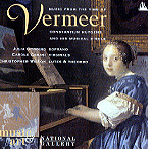Fans of early music are fortunate to have available such variety and quantity of high quality recordings. And since so much of this music consists of songs and other shorter vocal and instrumental works, programming possibilities are wide open. Further, the music’s common adaptability to arrangements of various combinations of instruments and/or voices (many works are ambiguous or non-specific regarding these things) allows for nearly limitless performance settings and many interpretive styles. This fine, intelligently programmed recording was made to complement a current exhibition at London’s National Gallery, titled Vermeer and the Delft School, which runs through September 16, 2001. The CD also is among a group of recordings produced for the National Gallery’s “Music & Art” series.
“Music from the time of Vermeer” roughly covers a period of 30 years, beginning in the late 1640s. The disc’s program specifically focuses on music associated with Constantijn Huygens, a composer, diplomat, and well-traveled friend and supporter of countless musicians, painters, philosophers, and scientists, who also was highly respected for his vast knowledge and varied artistic and literary skills. Except for Johann Froberger, who is represented by a solo keyboard suite, most of these composers’ names will be either unfamiliar or vaguely familiar–François Dufaut, Jacques Gaultier, Nicholas Lanier, Luigi Rossi, and Huygens himself–but the songs and dances performed here are all very agreeable bits of both the substance and finery of the period’s commonly enjoyed music. Kept to its simplest manner of presentation–combinations of voice, lute, theorbo, and virginals–the music makes its affect elegantly, gracefully, and, especially in the songs with texts, fully engaged with its emotional center.
Soprano Julia Gooding has a perfect voice (warm, slightly dark) and technique (agile, with well-centered tone) for these songs, whose themes center around love and longing and thus offer considerable expressive possibilities. Gooding makes the most of each lovely melody (and almost every one of these is a gem), easily and naturally illuminating the texts with subtle, tasteful ornamentation and a knowing way with dynamic variation and careful phrasing. (The two Lanier songs and Huygens’ Aubade: Le reveil de Calliste and three Psalms to Latin texts are exemplary.) Gooding gets tremendous help from her instrumental partners, who show themselves to be absolutely one with her as accompanists and further impress us with their interpretive and technical skills in their solo turns. (Lutenist/theorbo player Christopher Wilson is a standout–his delicate treatment of the two little Gaultier pieces is especially charming.) As for sound, you tend not to think about it because everything comes out so true to the timbres of voice and instruments–you “feel” the contact of quill on string in the Froberger suite for virginals. Of added interest is the appropriateness of the disc’s title: there’s an amazing congruity between the paintings of Vermeer (and others such as Pieter de Hooch) and this genteel, delicately detailed, warmly colorful music. This is one of those discs that might be easy to pass over in the CD-store bins. Don’t do it.
































